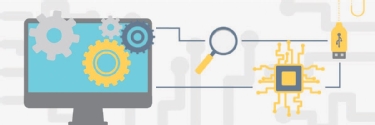Computer science
Definitions about computer science including computing fundamentals vocabulary, protocol and standards terminology, words about microprocessors and terms used in electronics.

Electronics
Terms related to electronics, including definitions about electrical components and words and phrases about computers, laptops parts, digital cameras, televisions and home appliances.
-
phase-locked loop (PLL)
A phase-locked loop (PLL) is an electronic circuit with a voltage or voltage-driven oscillator that constantly adjusts to match the frequency of an input signal.
-
What is a robot? Definition, purpose, uses
A robot is a machine designed to execute one or more tasks automatically with speed and precision. There are as many different types of robots as there are tasks for them to perform.A robot is a type of automated machine that can execute specific tasks with little or no human intervention and with speed and precision.
-
What is e-waste?
Electronic waste, or end-of-life (EOL) electronics or e-waste, refers to discarded, recycled or refurbished electrical and electronic products.
Internet technologies
This WhatIs.com glossary contains terms related to Internet technologies, including definitions about port numbers, standards and protocols and words and phrases about how the Internet works.
-
What is an IP address (Internet Protocol address)?
An Internet Protocol (IP) address is a unique numerical identifier for every device or network that connects to the internet.
-
What is a cloud access security broker (CASB)?
A cloud access security broker (CASB) is a software tool or service that sits between an organization's on-premises infrastructure and a cloud provider's infrastructure.
-
What is brain hacking?
Brain hacking, or neurohacking, is the application of techniques or technologies to affect an individual's mental state, cognitive processes or level of function.
IT standards and organizations
Terms related to information technology (IT) standards, including definitions about IT organizations and words and phrases about policies and compliance.
-
What is 5G New Radio (5G NR)?
5G New Radio, or 5G NR, is a globally accepted standard that delivers more responsive mobile experiences for a wide range of applications over fifth-generation wireless (5G) networks.
-
What is customer data integration (CDI)?
Customer data integration (CDI) is the process of defining, consolidating and managing customer information across an organization's business units and systems to achieve a "single version of the truth" for customer data.
-
What is an IP address (Internet Protocol address)?
An Internet Protocol (IP) address is a unique numerical identifier for every device or network that connects to the internet.
Microprocessors
Terms related to microprocessors, including definitions about silicon chips and words and phrases about computer processors.
-
What is a graphics processing unit (GPU)?
A graphics processing unit (GPU) is a computer chip that renders graphics and images by performing rapid mathematical calculations.
-
What is SDRAM (synchronous DRAM)?
Synchronous Dynamic Random-Access Memory (SDRAM) is a generic name for various kinds of DRAM that are synchronized with the clock speed that the microprocessor is optimized for.
-
What is an inductor?
An inductor is a passive electronic component that temporarily stores energy in a magnetic field when electric current flows through the inductor's coil.
Robotics
Terms related to robotics, including definitions about consumer or manufacturing robots and words and phrases about stepper motor systems, XY positioning tables, automation and artificial intelligence.
-
What is a robot? Definition, purpose, uses
A robot is a machine designed to execute one or more tasks automatically with speed and precision. There are as many different types of robots as there are tasks for them to perform.A robot is a type of automated machine that can execute specific tasks with little or no human intervention and with speed and precision.
-
What is the artificial intelligence of things (AIoT)?
The artificial intelligence of things (AIoT) is the combination of AI technologies and the internet of things (IoT) infrastructure.
-
What is the Fourth Industrial Revolution?
The Fourth Industrial Revolution (4IR) is the ongoing transformation of how people live, work and relate to one another through the fusion of technologies that blur the lines between the physical, digital and biological spheres.